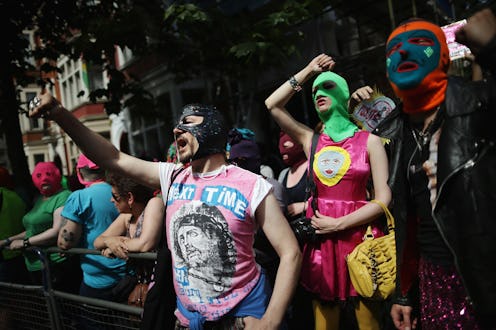News
Women's Rights Dealt a Blow in Spain
In spite of fierce opposition, the government of Prime Minister Mariano Rajoy approved a restrictive new abortion law in Spain Friday, one that would make it virtually impossible for women to get an abortion in the country. This move — which makes it legal to have an abortion until the 14th week only in expectional cases— will make Spain the first country within the European Union to essentially legalize and then illegalize abortion.
The decision comes after considerable pressure from the Catholic Church, which has been pushing for a repeal of the abortion reforms made over three years ago by Spain's previous government, that had made it significantly easier for Spanish women to get abortions. Since 2010, women have had the right to abort the fetus — without restrictions — up until the 14th week of pregnancy, going up to 22 weeks in the case of fetal deformities. Before that, abortions were only legal under very specific circumstances.
Friday's legislation — which is almost certainly going to pass, given that the anti-abortion Popular Party holds a clear majority in Parliament — harks back to pre-2010, making abortion legal only when there's been a case of rape, or when the pregnancy is causing serious mental or physical health risks to the mother. The latter has to be proven by the signatures of not one but two specialists — an important condition, considering that before the 2010 reforms, a large number of abortions were justified by appealing to the mental health risk category. As was also the case before the 2010 reforms, girls between 16 and 17 years old will now need the permission of their parents or legal guardians in order to get an abortion.
"We can't allow the life of the unborn baby to depend exclusively on the decision of the mother," said Justice Minister Alberto Ruiz-Gallardon, who announced the new law.
When the 2010 bill passed, the largely Catholic country reacted strongly, with thousands of pro-life demonstrators marching through Spanish cities in protest of the reforms — in spite of the fact that in 2007, at least 112,000 abortions were performed, despite the legal barriers. In 2011, roughly 118,000 abortions were performed in Spain, 100,000 of which would, under the new law, be considered illegal. Many critics are now worried that the new legislation will lead to "abortion tourism," where mothers are forced to travel to neighboring countries just to get access to abortions.
As Feminist Coordinator, a group of women’s rights organizations, said Friday: “The changes represent a reversal of our right to decide, which will take us back to another era.”
Already, roughly 500 activists gathered in front of the Ministry of Justice building in Madrid Saturday to protest the new law and call for Gallardon's resignation .
